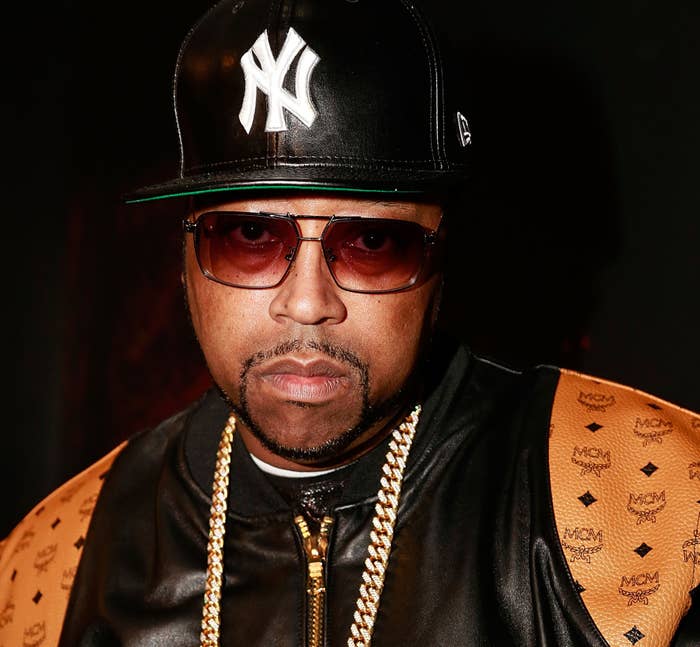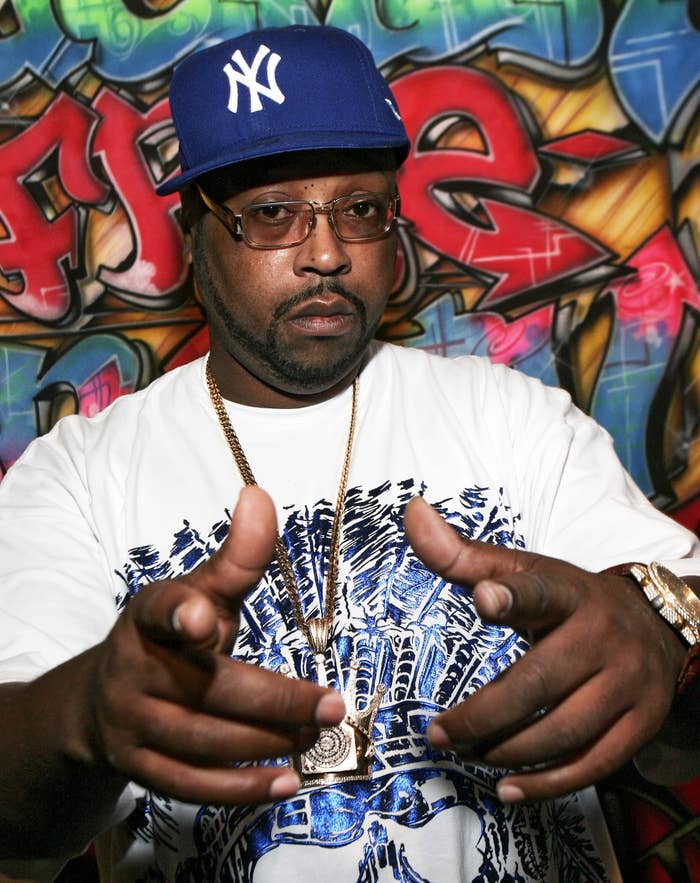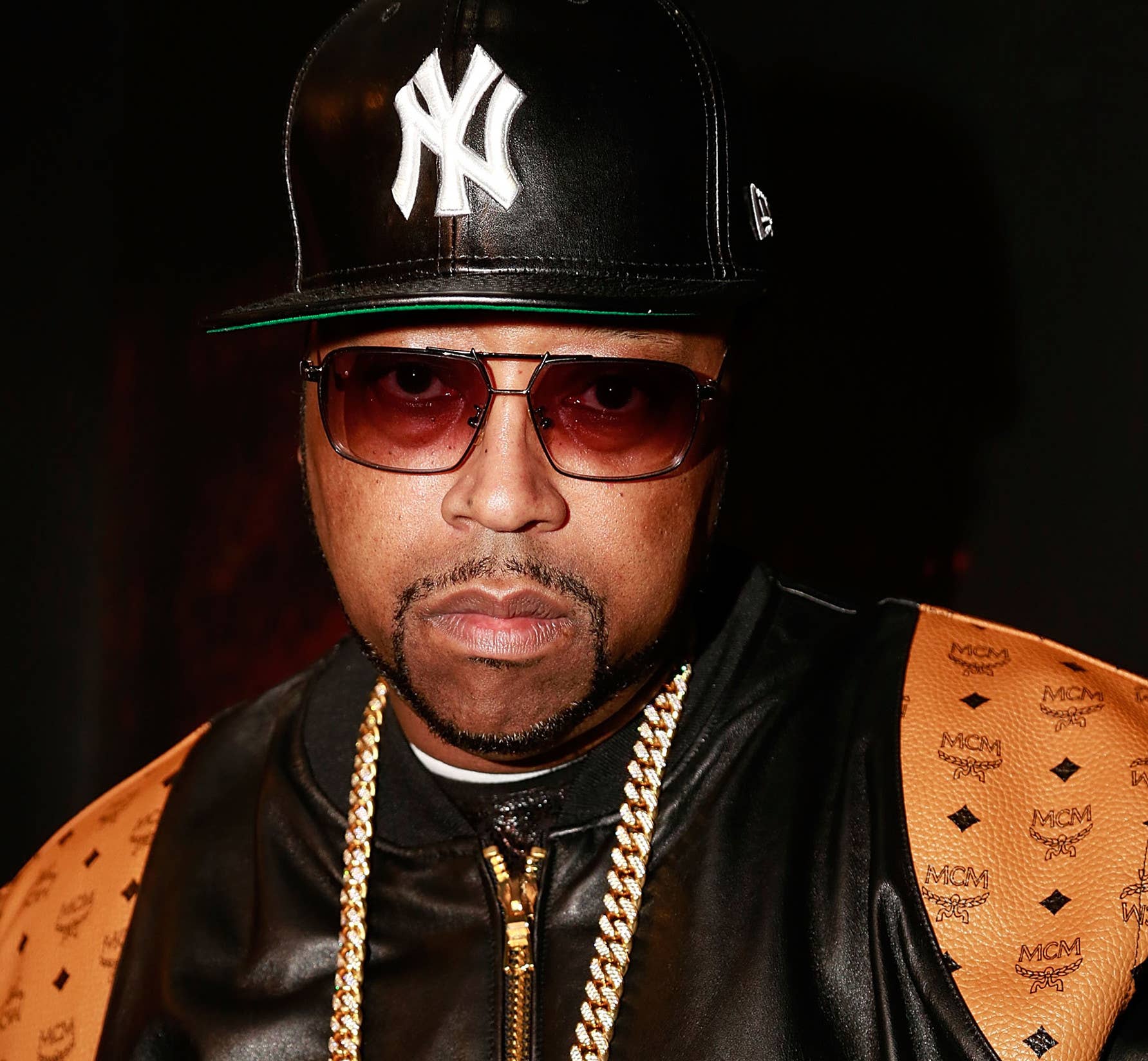
A culture is only as strong as its protectors, and with the passing of DJ Kay Slay, hip-hop culture lost a giant. He was a universally respected DJ whose reach in the hip-hop world spanned across generations and regions. His contributions include dozens of Streetsweepers mixtapes, as well as his legendary radio shows The Drama Hour and StreetSweeper Radio. His connections across New York City and beyond allowed him to curate multiple posse cuts with over 100 MCs, and debut tracks from a who’s who of 2000s New York rap, including Nas (“Ether,” “Made You Look” remix) and Jadakiss (“Checkmate”).
The legendary DJ died at the age of 55 on April 17 due to complications from COVID-19. He was in the hospital for months, and optimism about his condition grew when his brothers divulged in January that he was in a “recovery state” and had opened his eyes, but unfortunately, he passed away on Easter.
Kay Slay had a hand in the rise of iconic MCs like 50 Cent, Dipset, Kendrick Lamar, and so many more, by putting them on his mixtapes, giving them radio play, or allowing them to open shows. And before venturing into the music world, he was a respected graffiti artist known as Dezzy Dez, who was highlighted on 1983’s Style Wars, one of the first hip-hop documentaries ever. He was already a hip-hop legend before rap.
Born Keith Grayson, he was raised in East Harlem’s East River projects and grew up in New York’s tumultuous 70s and 80s, an era that’s beloved in hindsight for all of its cultural innovation, but was treacherous to live through. Like so many young people in that era, he tried his hands in the streets, jokingly telling Forbes in 2019, “There comes a time in people’s lives where you’ve got to admit that you’re not good at what you do. I was really wack at doing crimes. I kept getting caught!” Eventually, he was arrested for drug-related charges and did prison time.
Upon coming home in the mid-’90s, Kay Slay decided to focus on a career path he was good at: DJing. He put together a home studio and began working with artists to build his name. He reflected on ThisIs50 in 2016 that he got his Hot 97 show because Funkmaster Flex heavily campaigned for him after hearing one of his mixtapes that included an exclusive verse from Jay-Z dissing Meeno from Vacant Lot.
Back then, mixtape DJs made their name through exclusives. Rappers put their freestyles and upcoming tracks on mixtapes to build buzz, and the DJs who got those records first were kings. Kay Slay was New York mixtape royalty, along with DJs like DJ Clue, DJ Cutmaster C, DJ Envy, and others. Kay Slay excelled at building relationships and getting potent exclusives, including Nas’ “Ether,” the 50 Cent, Eminem, and Busta Rhymes “Hail Mary” diss to Ja Rule, Jadakiss’ “Checkmate” diss to 50 Cent, and Cam’ron’s “Swagger Jacker” diss to Jay-Z. He soon became a go-to for artists looking to debut their diss tracks, affirming his name as The Drama King.

Kay Slay fit that moniker with a boisterous presence on tracks that seemingly fueled their furor. He put his vocals and effects on songs after he received them, but it almost sounded like he was amping the artist. Streetsweepers mixtapes weren’t mere playlists of songs; he brought every collection of tracks into his world, where menace, blaring “damn” ad-libs, and random “bitch-ass niggas” were hurled at listeners at every turn. A Kay Slay tape was a war zone, and even listeners weren’t exempt from the smoke.
Even though he was the drama king, however, he wasn’t just focused on diss tracks and tension. “I don’t know about y’all [or] what y’all wanna do, I’m stayin’ true to the streets,” he said on his The Regulator Pt. 1 mixtape. While posturers have worn such phrases to meaningless shreds, Kay Slay actually embodied it.
He was nicknamed “Mr. Slap Ya Favorite DJ” because he wasn’t afraid to confront someone if necessary. He had infamous drug dealer Alpo Martinez host one of his mixtapes, and also had audio footage of Alpo and Azie Faizon talking on the phone, which was the first time the public had heard from the Paid In Full muses. He even set the tone for The Drama Hour show by doing a roll call of New York state prisons and telling them to “lock in,” knowing that those up top were ready to hear acts like The Lox, Dipset, Mobb Deep, Roc-A-Fella, and more talking their talk.
It’s well-documented that many industry suits have trouble relating to artists who come from the environment they’re rapping about, but they had a home with Kay Slay. 50 Cent has said, “I will never forget rapping in Kay Slay’s kitchen when I was trying to get on. He was the go to guy.” And 50 reiterated that sentiment in an Instagram post he made on Monday. Kay Slay helped 50 climb back into the industry after being shot nine times, dropped from Columbia Records, and, almost literally, being left for dead by the industry. Ja Rule and Murder Inc were on top of the rap game at that point, but Kay Slay didn’t care about the optics of working with their enemy, just like he didn’t care about Roc-A-Fella’s industry pull when it came time to debut “Ether.” If Kay Slay was rocking with an artist or song, he did what he wanted, politics be damned.
Kay Slay hosted the legendary Diplomats Volume series, which Cam’ron champions as the first free mixtapes pushed by an act instead of a DJ. Both Maino and Saigon have said that he gave them their first shot in the industry. Saigon, whose debut mixtape Yardfather Vol. 1 was hosted by Kay Slay, told Math Hoffa’s My Expert Opinion about his “supreme respect” for Slay, who set him straight when the Brooklyn MC was trying to force DJs to play his music after just coming home from prison. Maino shared a similar sentiment by eulogizing that Kay Slay “gave young hungry street artists a chance from all over. I was one.”
The Drama King’s reach and advocacy for talented, raw rappers extended beyond New York. His friendship with industry figure Wack 100 led him to meet Top Dawg and give the then-upstart TDE some of their first looks. He let a young Kendrick Lamar open up for Papoose during a mid-2000s Long Island show, and Kendrick would often come visit his studio when he was out east. There’s 2007 footage of him giving a Kendrick, Jay Rock, and Pill space to hold a freestyle session. Even though he admitted that he “underestimated” Kendrick at one point, he still gave him a chance. Kendrick paid that back with two features, the 2012 track “Highway To Hell” with Jay Rock and Schoolboy Q, and 2017’s “Cold Summer” with Mac Miller, Kevin Gates, and Rell. He managed to get a Kendrick feature when it was worth its weight in gold, just from looking out for artists on the come-up.
In 2005, Kay Slay dropped “Rolling 25 Deep,” featuring 25 acts, including Jae Millz, J.R. Writer, and Stack Bundles. Slay doubled up on that with 2020’s “Rolling 50 Deep,” with features from all over the map, including his right-hand man Papoose, Benny The Butcher, Royce Da 5’9, and Bun B. Last June, he went even harder with the 40-minute “Rolling 110 Deep.” It’s been said that Slay was set to release “Rolling 200 Deep,” featuring a whopping 200 MCs. Hopefully it still releases. In 2019, he asked writer Gary Suarez in Forbes, “Can you imagine someone trying to pay 89 artists their fee?” which hammered home how much respect Slay had to have to pull off his 2003 Streetsweeper Vol. 1 album. The love was warranted.
As hip-hop figures in their 50s and 60s continue to pass, we’re losing pillars that can’t be replaced. Our pioneers operate from a perspective steeped in hip-hop as a culture and artform first. They understand culture as a community, not a commodity. They were there in the parks, on the trains, and in the parties, immersed in hip-hop before a single dollar came. And because of that, they vie to protect and amplify hip-hop throughout their careers. They never colluded to sell us a watered-down version of the culture. No one can take their places, because it’s impossible to have their lived experience, or act on their praxis. The best we can do is try to stay true to the groundwork they laid and celebrate their legacies while we appreciate their peers who are still here. Go blast a Streetsweepers tape or a Drama Hour mix in memory of Slay.



